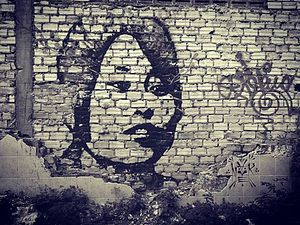As lead singer of the Cambodian Space Project and as a solo performer, Kak Channthy mesmerized and arguably did more for the rebirth of the Cambodian music scene than any other performer since peace was established in the country in 1998.
She died this week, aged 38, after the tuk-tuk she was traveling in was reportedly struck by a car. News of her death flooded online media with tributes pouring in from across Cambodia and much further afield.
Channthy, sometimes known as Srey Thy, or Miss Thy, toured the world and starred in a documentary “The Cambodian Space Project – Not Easy Rock n’ Roll,” made by German film maker Marc Eberle and Australian Richard Kuipers, tracing her rise from the Cambodian rice fields to sold out rock venues in Berlin.
It screened at the Cambodian International Film Festival in Phnom Penh two years ago and earned a standing ovation from a packed house.
Her music, strongly backed by the Space Project, mixed sounds of 1960s Cambodian pop – celebrated by the late King Norodom Sihanouk – with latter day rock, and breathed fresh life into a long forgotten era of stars, like Ros Sereysothea, Pan Ron, and Sin Sisomouth; many of whom would be targeted and killed by the Khmer Rouge after they seized power in 1975.
Gigs with Australian music icon Paul Kelly and American Motown legend Dennis Coffey helped cement her status as a bonafide rock star, one of the very few to emerge from Cambodia in the post-war years.
She could not read or write, and took one singing lesson before walking out. However, she had intellect. He was written into the syllabus of Media and Popular Culture at Pannasastra University and became a regular on the diplomatic circuit; she was a role model for young women.
But life was far from easy. She struggled with her father, an alcoholic who suffered post-traumatic stress syndrome stemming from his imprisonment by the Khmer Rouge, and a deeply impoverished upbringing where solace and inspiration was found listening to Chinese opera on radio.
Channthy started out in a village karaoke bar singing for around two dollars a night, but persisted with the encouragement of her mother and in spite of wrestling with traditional Khmer attitudes that frowned upon women who stray from established values and norms.
It was a mold Channthy hoped to break.
“Mum dreamed, she dreamed I can sing in the band. She was so happy. But in my village a lot of people would say; not so good, bad girl. But my mum, she kept me so strong so now I am fighting for her,” she once told me.
Her soaring voice won a legion of fans, with signature numbers like Whisky Cambodia, a grueling metaphor for the harsher side of Cambodian life, and Have Visa – No Rice, a testament to homesickness while on the road, underpinning her success.
The grind of touring and tight budgets also took its toll. The money she made was sent home to her village in Prey Veng in Cambodia’s east, where she was laid to rest, but throughout, Channthy took it in her stride. Offstage, she was funny, enjoyed a drink, would wink, smile, and toss her long mane of dark hair back and say: “Bong, not easy rock ‘n roll” (“Bong” being Khmer for brother).
This was on full display in a podcast with The Diplomat published in January, 2016, recorded with Julien Poulson, her former husband and founder of the Cambodian Space Project.
She had changed much over the last seven years. A book was in the offing, she talked of politics, Cambodia’s many ills, and social work: “I’m so happy, I have music now, I can look after my family, I can be strong – I don’t want to be down.”
It was a remarkable life cut too short.
Channthy leaves behind a 13-year-old son, Makara, two brothers, and a catalog of songs that rescued an important piece of Cambodian heritage from the misery of war and ensured her own legacy as a true Khmer artist will endure.
Luke Hunt can be followed on Twitter @lukeanthonyhunt.

































